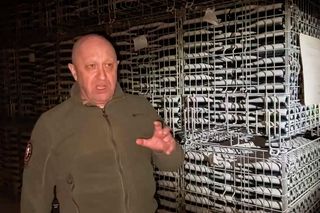Freeway Phantom podcast review: journalist seeks justice for serial killer’s victims
Celeste Headlee, host of the Freeway Phantom podcast. Photo by Tamzin B Smith
On April 25, 1971, 13-year-old Carol Spinks disappeared in Washington DC. Six days later, her body was discovered by a group of kids near a local road. Police assumed it was a one-off murder, but they were wrong: Carol had become the first-known victim of Washington’s first serial killer. By the end of the following year, five more black girls aged between 10 and 18 were dead: Darlenia Johnson, Brenda Crockett, Nenomoshia Yates, Brenda Woodard and Diane Williams.
There was no obvious pattern to the murders; most of the girls had gone out alone to run an errand at times that would have been impossible to predict. Because each body was discarded alongside a highway, local media began to call the killer the Freeway Phantom. Despite the killer taunting police with a chilling note and terrorising victims’ families by calling their homes, he was never found. The cases quickly went cold and the families never had the justice or closure they were due.
Five decades later, when journalist and public radio veteran Celeste Headlee heard about the murders, she believed the six victims deserved more. Her new 10-episode podcast Freeway Phantom (Tenderfoot TV with iHeartPodcasts and Black Bar Mitzvah, widely available) explores existing and new evidence in the hope of finally cracking the case. The show’s makers have put their money where their mic is: Tenderfoot TV and iHeart media have matched the $150,000 reward offered by Washington DC’s Metropolitan Police Department.
Headlee’s first breakthrough comes in the form of former DC police detective Romaine Jenkins. Now 80, she was the first female police officer in the local homicide department, and spent a great deal of her career on the Freeway Phantom case, which came to her when it was already almost a decade old.
Headlee asks an important question early: why was there so little sustained interest in the case? There is practically an industry around David Berkowitz (the ‘Son of Sam’) who killed six in July 1977; he crops up in books, documentaries, even an episode of Seinfeld. How could someone murder these girls and it be all but forgotten?
“I still feel pain to this day,” Carol’s sister Evander Spinks says in the first episode. Evander, who describes their neighbourhood as “good people in the worst of places” remembers everything about her sister’s disappearance, though after the funeral, her family didn’t discuss it for years.
Freeway Phantom explores racial disparities, how strategies for solving murders evolve over time, a continuing lack of trust between law enforcement and neighbourhoods, and the role community action can play in uncovering new evidence in decades-old cases.
It’s a well-made series that sets out to answer very difficult questions.














